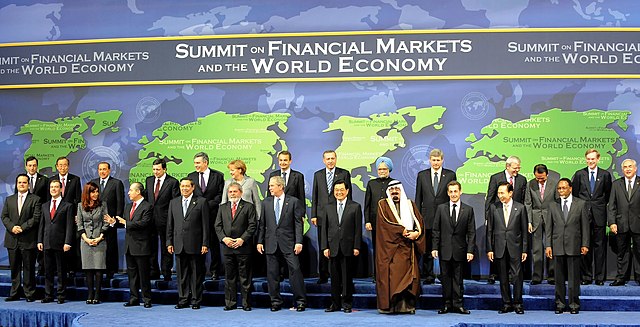A Middle power is a state that is not a superpower or a great power, but still exerts influence and plays a significant role in international relations. These countries often possess certain capabilities, such as strong economies, advanced technologies, and diplomatic influence, that allow them to have a voice in global affairs. Middle powers are typically seen as bridge-builders between larger powers, using their diplomatic skills to mediate conflicts and promote cooperation on international issues.
Leaders of the G20 countries and others present at the 2008 G-20 Washington summit. Most members of the G20 are middle powers while some are great powers.
A great power is a sovereign state that is recognized as having the ability and expertise to exert its influence on a global scale. Great powers characteristically possess military and economic strength, as well as diplomatic and soft power influence, which may cause middle or small powers to consider the great powers' opinions before taking actions of their own. International relations theorists have posited that great power status can be characterized into power capabilities, spatial aspects, and status dimensions.
Great powers are recognized in several international structures, including the United Nations Security Council.
In the mid-19th century, German historian Leopold von Ranke attempted to scientifically document the great powers.
The "Big Four" at the Paris Peace Conference of 1919: David Lloyd George, Vittorio Emanuele Orlando, Georges Clemenceau, and Woodrow Wilson
The "Big Three" of Europe at the Yalta Conference: Winston Churchill, Franklin D. Roosevelt, and Joseph Stalin





